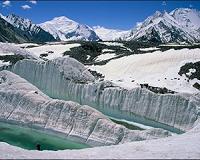| . |  |
. |
Columbus OH (SPX) Dec 10, 2010 One of the world's foremost experts on climate change is warning that if humans don't moderate their use of fossil fuels, there is a real possibility that we will face the environmental, societal and economic consequences of climate change faster than we can adapt to them. Lonnie Thompson, distinguished university professor in the School of Earth Sciences at Ohio State University, posed that possibility in a just-released special climate-change edition of the journal The Behavior Analyst. He also discussed how the rapid and accelerating retreat of the world's glaciers and ice sheets dramatically illustrates the nature of the changing climate. It is the first time in a published paper that he has recommended specific action to forestall the growing effects of climate change. During the last three decades, Thompson has led 57 expeditions to some of the world's most remote high altitude regions to retrieve cores from glaciers and ice caps that preserve a record of ancient climate. In the past Thompson has let his research data and conclusions speak for him but in this paper, intended for social scientists and behavior experts, he voiced his concern regarding the risks that ignoring the evidence of climate change may bring. "Unless large numbers of people take appropriate steps, including supporting governmental regulations aimed at reducing greenhouse gas emissions, our only options will be adaptation and suffering," he wrote in the concluding paragraph. "And the longer we delay, the more unpleasant the adaptations and the greater the suffering will be." In the paper (available here), Thompson said that virtually all climate researchers "are now convinced that global warming poses a clear and present danger to civilization." His opinion isn't hyperbole, he said, but instead is based on a "very clear pattern in the scientific evidence documenting that the Earth is warming, that the warming is due largely to human activity, that warming is causing important changes to many of the Earth's support systems, and that rapid and potentially catastrophic changes in the near future are possible. "Such future scenarios," he says, "emerge not, as is often suggested, simply from computer simulations, but from the weight and balance of the empirical evidence as well." Thompson listed three options humanity has for dealing with global warming which, he says, "is here and is already affecting our climate, so prevention is no longer an option." "Clearly mitigation is our best option, but so far most societies around the world, including the United States and the other largest emitters of greenhouse gases, have done little more than talk about the importance of mitigation," he says. He says that there are currently no technological quick fixes for global warming. "Our best hope," he says, "is to change our behavior in ways that significantly slow the rate of global warming, thereby giving engineers and scientists time to devise, develop, and deploy technological solutions where possible." Thompson prefaced his advice with examples of the Earth's diminishing ice cover, examples that constitute some of the strongest supporting evidence of the current threat of global climate change: + The ice fields atop Mount Kilimanjaro have lost 85 percent of their coverage since 1912; + The Quelccaya ice cap in southern Peru - the largest tropical ice field on Earth, has retreated 25 percent since 1978; + Ice fields in the Himalayas that have long shown traces of the radioactive bomb tests in the 1950s and 1960s have since lost that signal as surface melting has removed the upper layers and thereby reduced the thickness of these glaciers; + All of the glaciers in Alaska's vast Brooks Range are retreating, as are 98 percent of those in southeastern Alaska. And 99 percent of glaciers in the Alps, 100 percent of those in Peru and 92 percent in the Andes of Chile are likewise retreating; + Sea levels are rising and the loss of ice coverage in the North Polar region continues to increase annually. "Everyone will be affected by global warming," Thompson wrote. "But those with the fewest resources for adapting will suffer the most." A research scientist with Ohio State's Byrd Polar Research Center, Thompson is a member of the National Academy of Sciences and a foreign member of the Chinese Academy of Sciences. In 2007, he received the National Medal of Science, the highest honor the United States gives to American scientists.
Share This Article With Planet Earth
Related Links Ohio State University Climate Science News - Modeling, Mitigation Adaptation
 Himalayan Glaciers Melting At Alarming Rates
Himalayan Glaciers Melting At Alarming RatesCancun, Mexico (SPX) Dec 09, 2010 Concern for high-mountain regions of the world is rising, according to a new report released by the United Nations Environment Programme (UNEP), which states that the Himalayas and many other glaciers are melting quickly, threatening lives by flooding, and by reducing the region's freshwater supply. The findings of the report, "High mountain glaciers and climate change" were announced duri ... read more |
|
| The content herein, unless otherwise known to be public domain, are Copyright 1995-2010 - SpaceDaily. AFP and UPI Wire Stories are copyright Agence France-Presse and United Press International. ESA Portal Reports are copyright European Space Agency. All NASA sourced material is public domain. Additional copyrights may apply in whole or part to other bona fide parties. Advertising does not imply endorsement,agreement or approval of any opinions, statements or information provided by SpaceDaily on any Web page published or hosted by SpaceDaily. Privacy Statement |